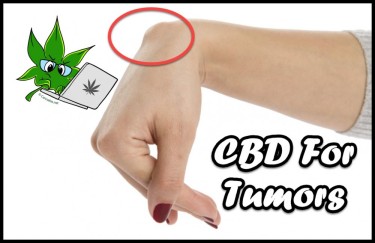
CBD limits tumor growth in cancer patients, new medical studies say
The Big C is a serious disease afflicting large populations around the world.
According to the World Health Organization (WHO), around 10 million people worldwide died of cancer in 2020 alone. It is still the leading cause of death worldwide and not only has an impact on families and societies as a whole, but also has a huge impact on the economy.
While early detection is always the best scenario for treating and improving the prognosis, it is not always possible. Treatment for cancer and tumors includes one or a combination of methods such as chemotherapy, radiation therapy, or surgery. However, for higher-grade tumors, treatment may require surgery, plus radiation therapy, and then chemotherapy.
How cannabis helps with cancer
A new study from Augusta University that focuses on glioblastoma, one of the deadliest and fastest growing forms of brain tumors, shows that cannabidiol (CBD) is a useful form of treatment. The prognosis for glioblastoma is a survival rate of 15 months after diagnosis, based on data from the Glioblastoma Foundation. Despite new research on cancer over the past 15 years, the survival rate has only increased by 2 months, explains Dr. Martin Rutkowski, a Medical College of Georgia at AU Neurosurgery and a researcher on the study.
“We’re pretty desperate for better therapies,” he tells the Augusta Chronicle.
Cannabidiol has a lot of potential for tumor therapy, says Dr. Babak Baban, Assistant Dean of Research, Dental College of Georgia. It’s considered relatively safe and has been shown to help regulate the immune system effectively. Baban explains that glioblastomas create a microenvironment that is “one of the most complex for tumors”.
The tumors grow by forming new blood vessels, a process known as angiogenesis. “It can spread through angiogenesis, it can survive,” he says. Instead, the glioblastoma is “the most aggressive in the central nervous system”.
The researchers used mouse patients who had to produce the tumors internally and were then given inhaled CBD. Thereafter, the tumors shrank noticeably compared to the mice that were not given CBD. In addition, they found that CBD appeared to block at least 3 components required for angiogenesis.
That being said, glioblastomas are difficult to treat because they evade the immune system through immune checkpoints. Rutkowski illustrates this by comparing it to a protective barrier that forms around the tumor. “They’re very good at shielding themselves, so we need ways to drop the shield and make the immune system more effective at finding them,” he says.
“I’m skeptical when it comes to using CBD to treat depression or anxiety or financial hardship or marital problems,” he says. “That is probably not all true. But now that we have some basic science to support this therapy, I find it really exciting. “
“Overall, our new findings support the potential therapeutic role of inhaled CBD as an effective, relatively safe, and easy-to-administer treatment aid for GBM with significant effects on cellular and molecular signaling of TME (tumor microenvironment) that warrant further research,” the authors say shut down.
In October 2021, doctors in the UK published an article documenting an elderly woman in her 80s diagnosed with lung cancer. The case, published in BMJ Case Reports, describes her medical history, which included high blood pressure, chronic obstructive pulmonary disease and osteoarthritis.
The woman admitted smoking more than one pack of cigarettes a week, both before and after her diagnosis. Until June and July 2018, the doctors tested them with a PET scan, MRI, CT scan and a biopsy. They diagnosed her with stage IIB non-small cell lung cancer (NSCLC). By September 2019, the chest CT scan was repeated and showed 2 new nodules in the upper right lobe and the left apex. She declined to have surgery to remove the flap due to risks and also declined radiofrequency ablation due to the side effects her late husband had suffered from radiation therapy.
At this point, she admitted to starting the CBD oil treatment with 0.5ml orally 3 times a day and then twice a day after diagnosis. The CBD oil supplier advised her not to take the CBD oil with hot drinks or food to avoid feeling stoned, and she also reported an appetite decrease with CBD oil. Even so, she did not change her lifestyle or diet, and even continued to smoke a pack of cigarettes a week.
“We definitely did not expect that without conventional cancer treatments and without other changes in health or lifestyle there would be such a marked tumor regression…. Several studies on animal models have shown conflicting results so far, with some cases reducing the growth of cancer cells and others showing accelerated growth of cancer cells, ”commented lead author Dr. Kah Ling Liew.
Dr. Jack Jacoub, medical director at MemorialCare Cancer Institute at Orange Coast Medical Center and medical oncologist, told Medical News Today, “This is definitely hypothesized and requires additional research before it becomes a recommended treatment option for patients.” Cancer. From a scientific point of view, a case report is the weakest strength, so you have to take into account what you read about it. “
Using cannabis with other cancer therapies
Although more research is needed in this area, there are already several promising studies suggesting that CBD is particularly effective in addition to other conventional cancer therapies.
In addition, radiation and chemotherapy are notorious for their side effects, which are often so severe that they discourage patients from continuing therapy and affect survival rates. The most common side effects are loss of appetite and nausea, which lead to weight loss.
Many studies show the effectiveness of cannabis in alleviating these side effects; CBD can suppress the anxiety associated with cancer or chemotherapy and radiation, while THC can improve appetite.
If you are considering using CBD in conjunction with other tumor control therapies, you should always do so under your doctor’s supervision.
CBD, CANNABIS AND TUMORS, READ MORE …

HARVARD LOOK FOR CANNABIS TO REDUCE TUMOR GROWTH.
OR..

How CBD Tracks Tumor Growth, and What Doctors Know?

Post a comment: